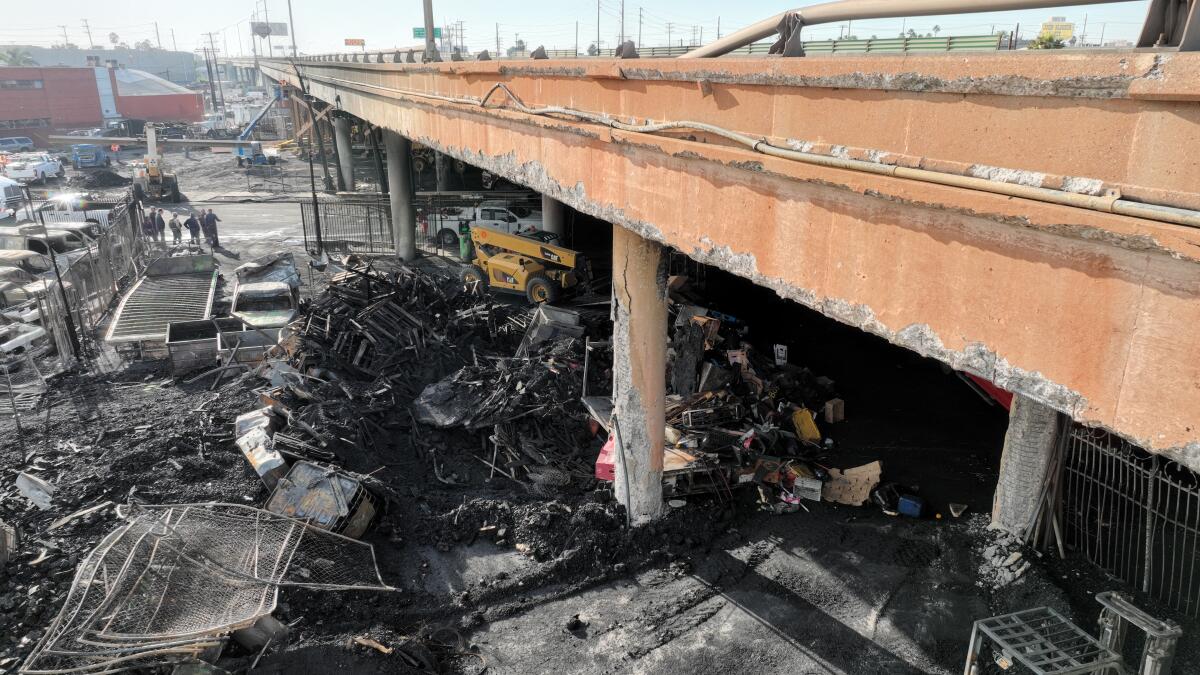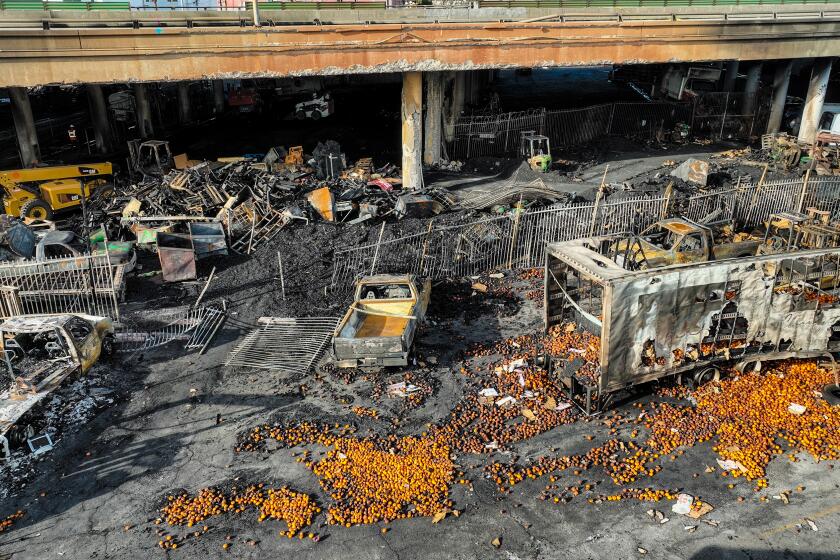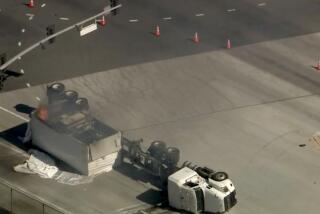After I-10 fire, Caltrans finds more hazards under freeways, recommends revamp of leases

Three months after a pallet-fueled fire erupted under the 10 Freeway, shutting down traffic for days, new findings show that propane tanks, flammable liquids, faulty wiring, combustible material and similar pallet stacks posed hazards at dozens of Caltrans-leased properties under and next to the state’s freeways.
Since the blaze, the State Fire Marshal inspected 37 sites identified as risks, including several in Los Angeles, and found that most presented hazards. In one case, along the 101 Freeway near the Vermont Avenue overpass, the inspectors found stacked tires, compressed gas containers and piles of trash. Caltrans said it gave tenants 30 days to correct the violations.
The findings raise new questions about the amount of oversight the California Department of Transportation had over its $35-million airspace leasing program, which leases out 600 properties under and around freeways across the state.
For the record:
5:40 p.m. Feb. 9, 2024A previous version of this article said that a Feb. 6 memo to Gov. Gavin Newsom was sent by California Transportation Secretary Toks Omishakin. The California State Transportation Agency later said the memo was sent by California Department of Transportation Director Tony Tavares.
The memo outlining the agency’s review was sent to Gov. Gavin Newsom by Caltrans Director Tony Tavares on Feb. 6 and details a set of recommendations to improve the program.
In it, Tavares says the state should explicitly prohibit storage of oil, gasoline, lumber, pallets, wood, wood chips, landscaping materials, nonworking vehicles, plastic piping/tubing, tires, paper products, fabrics, batteries and industrial quantities of chemicals and cleaning supplies under bridges and other structures.
Officials have not announced an arrest in the Nov. 11 fire believed to have been caused by arson. Flames ripped through about a dozen businesses that had subleased a slice of property under the 10 Freeway, including a mechanic, a pallet distributor, a garment supplier, a recycler and others whose wares helped fuel the fire.
For years the businesses operated between the freeway pillars on East 14th Street a block east of South Alameda Street. Along the perimeters, homeless people camped and lighted fires to keep warm. The conditions apparently did not raise any alarms among state officials who had inspected the site.
Tavares said in the memo the agency should not provide the same leeway agents had given before the fire. Instead, enforcement should be strict with a new policy to require correction of “high-risk” safety violations within three business days or “a reasonable amount of time under the circumstances.”
Caltrans was trying to evict the company leasing the lot that caught fire and severely damaged the 10 Freeway. Agency says it illegally sublet the property to several small businesses.
“Caltrans policy should require that risks involving flammable, combustible, explosive, or other hazardous materials stored under structures must be addressed immediately, and enforcement, up to and including litigation, should be pursued promptly if a lessee does not comply,” he said in the memo.
He also outlined steps to take better inventory of the leased properties and tighten restrictions on renters.
The 48,000-square-foot triangular lot at South Alameda and East 14th streets, where the fire tore through, had been leased by an absentee landlord, who subleased parcels of the property to others and failed to pay Caltrans rent for more than a year, according to the state.
Tavares said Caltrans is developing language to update its policy manual with these recommendations and expects to have it ready by the end of March.
Newsom, who had ordered a review of the program, said these changes will “streamline enforcement, improve actions to address risks, and provide an overall safer environment for this program.”
More to Read
Sign up for Essential California
The most important California stories and recommendations in your inbox every morning.
You may occasionally receive promotional content from the Los Angeles Times.












